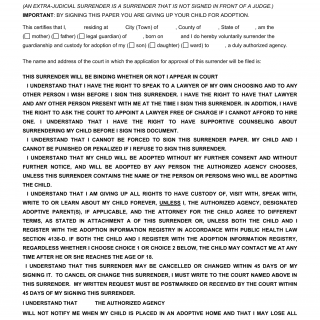OCFS-4316. Extra-Judicial Surrender
Form OCFS-4316, Extra-Judicial Surrender, is a document used by parents in New York State to voluntarily surrender guardianship and legal rights to a child. By signing the form, the parent agrees to give up their right to make decisions for the child and to receive notice of any future court proceedings related to the child. This form is used to legally transfer legal guardianship of a child to either a relative or to an agency such as the New York State Office of Children and Family Services (OCFS).
This form is typically used when a parent voluntarily chooses to surrender their rights to a child because they are unable to provide the necessary care and support required. It is also used when a parent is no longer able to provide financial security for the child or wishes to give the child up for adoption. The form is commonly used by foster parents and adoptive parents who wish to take legal guardianship of a child in their care.
The form contains sections for identifying the parent and the child, including name, address, date of birth, and relationship. It also includes sections for identifying the person or agency to whom the parent is transferring legal guardianship of the child. The form requires the parent to provide their signature, as well as the signatures of two witnesses. The form must be notarized before it can be legally accepted.
An example of when this form would be used is when a parent is unable to continue raising a child due to circumstances such as illness, financial hardship, or other reasons. The parent would need to fill out the form to surrender their guardianship rights to the child, allowing the child to be placed in the care of a relative or agency. By completing the form, the parent can guarantee that the child will receive the care and support needed to thrive.
In addition to the Extra-Judicial Surrender form, parents may also need to complete other documents such as a power of attorney or adoption papers. In some cases, an alternative form may be available to accomplish the same purpose, such as a guardianship order from a court. It is important to understand the purpose and implications of the form before signing, as it may have lasting effects on both the parent and the child.

